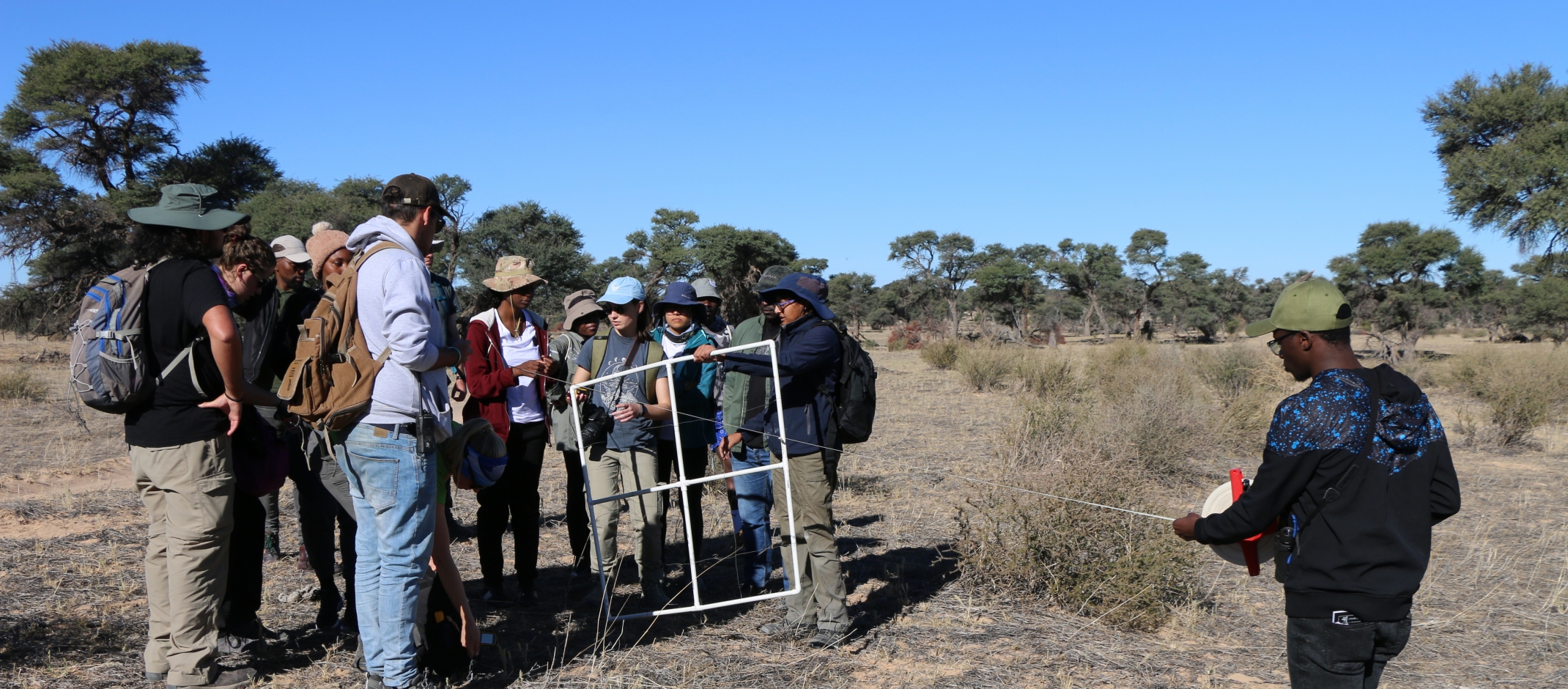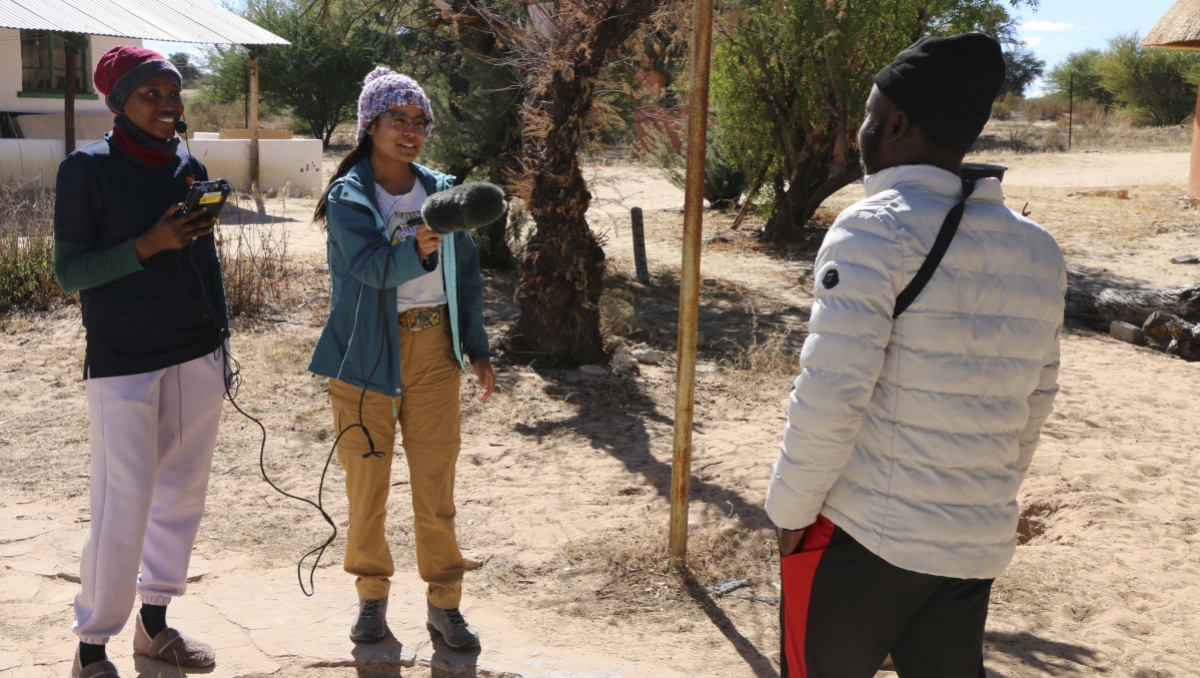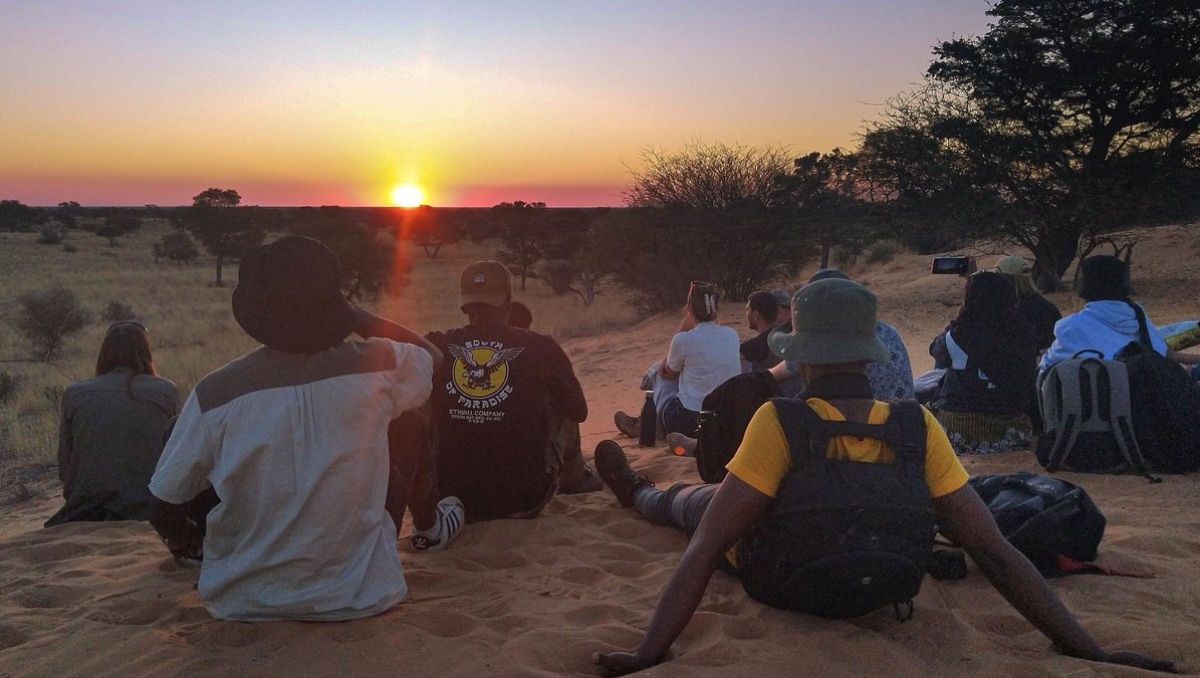Hands-on field training

Studying collective behaviour in the natural environment of the animals of interest is challenging. It requires detailed knowledge of the available tools and methods for data collection and analysis. Biologists Gabriella Gall and Vlad Demartsev from the Konstanz Cluster of Excellence Collective Behaviour have learned this through years of fieldwork. To equip emerging researchers with the skills, they decided to conduct an annual collective behaviour field course at the Kalahari Research Centre (KRC) in South Africa. In this interview, they discuss the goals of the course, and share insights into their own mishaps and highlights from their fieldwork.
You have been conducting research at the Kalahari Research Centre in South Africa for years, and you also hold your field course there. What makes this location special? And why do you specifically offer it to students from South African universities?
Vlad Demartsev and Gabriella Gall: Offering the course at the KRC allows the students to experience life and work at an active research station, interact with an international team of resident scientists and get a glimpse at the prospects of a career as a field biologist. By offering field courses specifically to students from South African universities we want to empower them to conduct research in their own country and demonstrate that at a later stage of their careers they will be welcomed to do their work at the KRC.
The Kalahari Research Centre offers an opportunity to observe and study a wide range of species such as meerkats, squirrels or hornbills in their natural environment. It is also a home to several long-term research projects which provide valuable data for understanding and protecting these species and one of the world's most fascinating ecosystems.
Kalahari field course
The two-week field course on Behavioural Ecology and Animal Communication, organized by the Kalahari Research Centre (KRC) and the Cluster of Excellence Centre for the Advanced Study of Collective Behaviour (CASCB), gives students an opportunity to learn and practise field research techniques.
In conclusion, what was your biggest mishap during your own fieldwork that you can now laugh about in hindsight? And what was your most memorable field work experience?
Vlad Demartsev and Gabriella Gall: Field work is always full of surprises and things that go wrong. The two major must-have qualities for a field biologist are being able to laugh about mishaps and at the same time being able to improvise solutions with limited available tools and resources.
Vlad Demartsev: For me the biggest field “disaster” probably happened in 2021, when we fitted a whole group of meerkats at the KRC with miniature Audio-GPS loggers. It was quite an effort to make sure all individuals in the group are tagged and we were very excited about managing it. However, we did not account for how rough Kalahari winters can be sometimes. The night before the loggers were programmed to start collecting data, the temperature dropped to -14 degrees. The miniature GPS batteries froze and almost all the loggers failed to start in the morning. We had to quickly improvise a solution, rebuild the loggers with new batteries and redeploy them on the animals.
Gabriella Gall: One of the most fascinating experiences I had at the KRC, was a rainy day in winter (they are very rare) coinciding with a puff adder at a meerkat burrow where an inter group encounter between two meerkat groups happened, with the larger group trying to excavate the smaller, while the smaller sneaked out via a back entrance and snuck back a couple of times to rescue their pups. The small group was also the group I was trying to collect data on at the time (and failed on that day).
"Have a solid plan but be ready to improvise! Field work with wild animals is unpredictable."
Vlad Demartsev
What tips and tricks can you share for things to watch out for when going into the field for the first time?
Vlad Demartsev: Have a solid plan but be ready to improvise! Field work with wild animals is unpredictable as they never read our carefully drafted experimental protocols and might not play along. Account for the field data collection always takes longer than initially thought due to things like weather, equipment failures, and often just purely bad luck. Back up your data daily or as frequently as possible as every observation or experiment is unique and irreplaceable. Most importantly remember that everyone makes mistakes. Learn from them, laugh about them but never get discouraged by them.
Gabriella Gall: From my perspective, the most important thing to remind young researchers of when going to the field for the first time, is to not only think about the research, which is bound to be the main focus, but also the ‘life’ part. Make sure you have good footwear, and clothing, and bring something good to read. For the research part: As Vlad says, try to prepare and think of possible failed saves, but once you are in the field, just do your best and enjoy the experience!
"From my perspective, the most important thing to remind young researchers of when going to the field for the first time, is to not only think about the research, which is bound to be the main focus, but also the ‘life’ part."
Gabriella Gall
What inspired you to develop and conduct a dedicated course on studying collective behaviour in the field?
Vlad Demartsev and Gabriella Gall: We wanted to expose the next generation of scientists to the field of collective behaviour and to equip them with the tools and skills to conduct their own research. Our own fieldwork experiences highlighted the importance of hands-on training. Organising the course around field work and methods for data collection seemed like a good solution for bridging the gap between theoretical knowledge and practical experience in this exciting field.
You conducted the course for the second time in 2024. What is important for you to convey during the course?
Vlad Demartsev and Gabriella Gall: During the course, we emphasize the importance of formulating clear research questions and predictions, careful observation and robust analysis techniques. We also highlight the challenges and rewards of observing animals in their natural settings. The positive feedback and enthusiasm from the participants in the previous courses as well as overwhelming support from colleagues motivate us to continue offering this unique opportunity.
https://youtu.be/qJD1tOXZYZY
The participants are expected to implement their own research project by the end of the course. I am curious to know what ideas they came up with.
Vlad Demartsev and Gabriella Gall: One particularly interesting project involved looking at the collective nest departures in sociable weaver colonies, predicting that larger colonies will require more time to coordinate departure time. Another great project looked at the activity and behaviour of termites across different habitats and with regards to changes in ambient temperature. We were impressed by the students' ability to apply the knowledge and skills they gained during the course to their own research questions. Overall, the eight projects we had in the past two years were fascinating. The students demonstrated a great interest in animal behaviour, and the potential for innovative research in this field.
How is such a field course possible to implement?
Vlad Demartsev and Gabriella Gall: One major reason this course is so successful is the amazing people that help us organize and teach it. Chanel Rhampartab from the University of Witwatersrand as well as Kyle Finn of the University of Pretoria both contribute from their unique skills and knowledge and add modules to the program that we would not be able to teach ourselves. Syiabonga Sangweni, who was a student in the 2023 cohort, joined us as a Technical Assistant in 2024. We also are grateful to the KRC directors, Marta Manser and Tim Clutton-Brock for supporting this initiative and allowing us to organize this course at the field site. Also, a central role in the positive student experiences from the course are the KRC researchers and staff. They welcomed us with open arms, were approachable and accessible for the students and were happy to tell them about their work and life at the site. Last but not least a big thanks to the University of Konstanz, the Association for the Study of Animal Behaviour and the Cluster of Excellence Collective Behaviour at the University of Konstanz for recognising the importance of removing financial obstacles for participation at this course and funding this program in the last two years.




